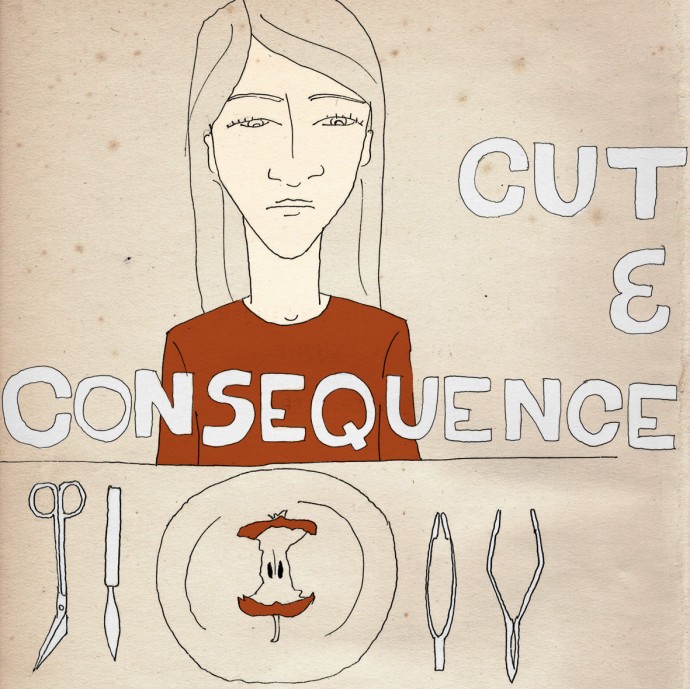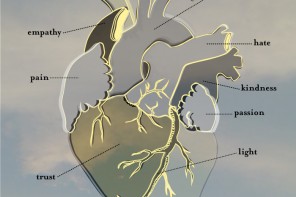Female circumcision is a term used to describe the partial or complete removal of a woman’s clitoris and/or labia minora. After being declared illegal in Egypt five years ago, the practice has shown signs of waning. Nevertheless, it is currently estimated that over 90% of Egyptian women aged 15 to 50 were circumcised before they reached puberty. Nancy, a 30 year old Egyptian artist who underwent the procedure when she was 11, reflects upon how it later contributed to a period of sexual self-inquiry and exploration, and how this phase ultimately helped her come to terms with her sexuality and her views on the controversial practice.
When I was a child, my parents got into a huge argument. When my mother complained that she wasn’t sexually satisfied, my father accused her of being impure and out of control because she was American and not circumcised. The event traumatized her, and she was terrified that the same thing might happen to me when I got married. She turned to her Egyptian friends and neighbors for advice, and they convinced her that I should be circumcised even though my father was against the idea. He thought that because it might ruin my ability to find sex pleasurable, that I would disappoint my future husband. Scared and confused by my father’s contradictions, my mother conspired to err on what she considered to be the side of caution without his knowledge.
She had wanted me to wear a headscarf because, like my father, she insisted that I be raised in the Islamic tradition. As a child, I was stubborn about it. I thought that covering my hair made me look less pretty, and I grew to hate doing so. Knowing this, my mother bribed me. She told me that if I got circumcised, I would no longer have to wear a headscarf. I eagerly agreed, convinced that I was making the right choice. I couldn’t have known that I would regret it once I had grown older and discovered my sexuality.
Clinics in Egypt’s larger cities that offer the surgery are normal ones for women who are pregnant or need gynecological check-ups. Though illegal, procedures such as female circumcision, hymen restoration, and abortion are offered on the side. The only way to find out about where to get these services done is through word of mouth, and you would need a trusted referral if you called to make an appointment.
It was to one such clinic that my mother took me soon after I had agreed to be circumcised and while my father was away on a business trip to the United States. The surgeon was a man. I remember feeling shy and embarrassed as I lay on a long table under bright lights. I did, however, feel better knowing that my mother would be in the room with me. She had promised that she wouldn’t leave because she was very concerned that the doctor didn’t cut too much off. Unlike in Egypt’s rural areas, the goal of the surgery in the country’s bigger cities isn’t to completely eliminate a woman’s sexual pleasure. Instead, the idea is to somehow make her more in control by only removing the tip of her clitoris so that she’s not overly sexual or inclined to cheat on her husband when he’s away.
In Egypt, female circumcision is completely normal. Women speak of it the same way they do about getting wisdom teeth pulled. I went to school and told my friends that I’d had ‘it’ done. We laughed about it. Yes, it was painful, but I was proud. Egyptian cultural values convinced me that having undergone the procedure meant that I was purified, though at that age I didn’t really understood what that meant. Because it happened to me at such a young age, I really had no way of anticipating the procedure’s sexual consequences. Having no concept of an orgasm, my only real concern was removing my headscarf so I would look prettier.
Despite Egypt’s conservative social standards, most young people do fall in love and have relationships, but not in the open. Their parents and neighbors probably wouldn’t know about it. They can’t really go out in public together without damaging either family’s reputation. When they do find ways to be alone together, they naturally explore their sexuality, but they have a mutual understanding. They could never break the woman’s hymen because she needs to be considered a virgin in order to get married. When I was twenty, I was in a situation like this. I trusted a guy and he knew I was a virgin. He promised that we wouldn’t have intercourse, but in the moment he took advantage of me. I tried to stop him, but it wasn’t possible.
Soon afterwards, I left Egypt to continue my education in the United States. Having been partially circumcised and also raped really caused me a lot of psychological distress. By this time, I certainly knew all about sex. Nonetheless, I had always felt sexually cold, and I didn’t know if this was at all related to my having been partially circumcised. Regardless, I blamed my mother for having tricked me into never knowing if this was actually the case. On top of it all, I also realized that I had no reason to protect my virginity anymore. Imagine having been told your entire life that you needed to protect something only to have it stolen from you. I felt free, but at a terrible cost.
Over the next two years while I was in the States, I became reckless. When I first arrived, I’d hear women colleagues say, “I need to get laid!” or “I haven’t had sex in two weeks and I’m going crazy!” I’d think, “Why don’t I ever feel like that?” I wondered whether or not there was something wrong with me. Even though I knew that I wasn’t very sexual, I decided that I needed to force myself to behave as if I actually was. I’d have sex with random people I’d meet on the internet. In some cases, I wouldn’t even feel like it, or I wouldn’t even be attracted to the person, but I didn’t care. I’d go on dates with guys whom I’d met at school, work, through friends, or in a bar, and I’d have sex with them if they made a move. It didn’t matter if I wasn’t interested. I never refused.
Returning to Egypt put an end to this phase. Ultimately, I accepted that I really am not all that sexual. I can only assume that having been partially circumcised is the cause. True, it may have nothing to do with having undergone the procedure, but I’ll never know. Regardless, I can go for six months to a year without sex and it’s not a problem. There is no longer a point in trying to prove to myself otherwise or to hold on to the anger I felt towards my mother. She was, after all, just trying to protect me.
Though it did cause me a lot of lasting emotional pain and confusion, I’m at a stage of my life now where having been partially circumcised really doesn’t bother me personally anymore. I’m not in a relationship, so I don’t really think about it. I don’t have much sexual desire, and it’s very difficult for me to reach orgasm. It’s complicated, and takes a lot of time, communication, and explanation. It can be a drag, but I’m not worried. These things could very easily become an issue for the person I choose to be with. Yet, as cliched as it may sound, I really do believe that love conquers all. I’m confident that if and when I meet the right guy, he’ll be understanding and that things will work out. In the meantime, I’ve made peace with who I am, including what having been partially circumcised may have made me.
That being said, the fact that I have learned to accept my own fate doesn’t mean that I think others should share in it. My hope is that all forms of female circumcision be banned worldwide. I’m lucky and grateful that I only had part of my clitoris removed. In rural Egypt, and in other African countries, they cut everything off. In extreme cases, the scar tissue is sewn up, fused together, and then re-opened when a woman is married. It’s barbaric, and I think that any man who forces circumcision upon a girl should have part of his penis cut off. In turn, any woman who does so should have part of her hand cut off because, sadly, she is probably already a victim of the procedure herself.







